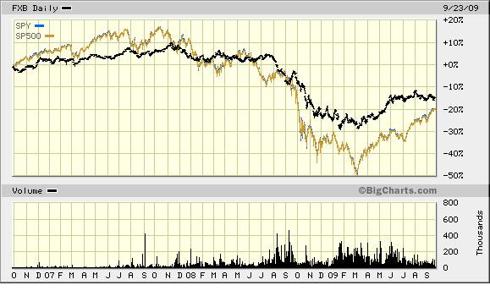Yesterday, the Bank of England vote unanimously to leave the size of its asset purchase plan unchanged at 175 billion pounds and voted to leave interest rates unchanged at 0.5%. This is seemingly good news for the Pound in the near-term, as the currency markets are reflecting this morning with the British pound up vs. other currencies. But what is the outlook for GBP going forward?
Back in August at the BOE, there were some who had wanted even more quantitative easing yet were comfortable with following through with the plans laid out in August, as the September minutes show. So while economic conditions have stabilized just enough to warrant a continuation of policy, is a full blown recovery already underway?
Methinks Not!
Let’s take a look at a few factors that could “weigh heavily” on the British pound and what this means for other markets as well.
For starters, it is commonly known that the British are more “conservative” than their free-wheeling Yankee neighbors across the pond. This means that they usually take more thought-out measures and need more convincing that a dire situation may persist. Thus it is no surprise that they left policy unchanged. Some would argue though that this makes them more re-active than pro-active, and that by the time increased negative forces come to light, it could be too late. Quite the opposite of Bernanke et al. So in this regard, we can’t rule out the possibility of further quantitative easing should conditions deteriorate.
But the British Bankers Association (BBA) just reported that loans for home purchases declined from the previous month and missed expectations, a sign that perhaps their economy is not ticking up or that the QE measures the BOE has taken haven’t taken hold yet as tighter credit conditions haven’t sparked an uptick in demand. Should housing demand continue to fall, then this could prolong the economic recovery they are hoping for.
So if housing prices decline as a result of falling demand, then the BOE might just have to deal with deflationary pressures rather than the inflation they are hoping for. This could mean more QE which would put further pressure on the British pound.
However, in the near-term, I can’t see the GBP falling against the US dollar as Bernanke’s path to dollar destruction has been well-established. As I wrote on Monday, nothing is going to change at today’s FOMC meeting (about an hour away) as Bernanke doesn’t want to spook the stock market. And the correlation between the S&P 500 index (SPY) and the British pound (FXB) has been pretty tight. Here’s a 3-year chart:
So if we are expecting the stock market to advance on Bernanke’s non-action at the FOMC meeting, then it follows that the dollar should decline and the pound should advance.
However, should the stock market run out of gas later this year, this could coincide with British pound weakness as a result of sluggish economic growth in the UK. This could be the double-whammy that the stock market Bears have been looking for.
But until that occurs, keep your eyes on the British economy and don’t fight the Fed!
